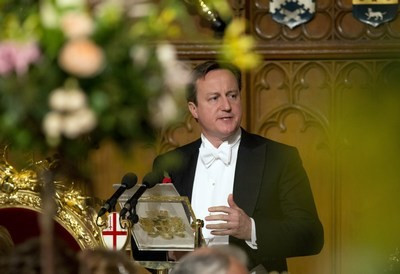Cameron Tells the Poor: Raise your Aspirations

Social mobility is the issue that refuses to go away and David Cameron has pushed it further up the political agenda with remarks that the government needed to get youngsters from poorer and ethnic backgrounds to raise their aspirations.
Speaking as he flew to India on his way to a meeting of Commonwealth heads, the prime minister was tackled over John Major saying he was "shocked" at the way the upper echelons of public life were dominated by a privately educated, privileged elite.
Rather than seeing the words as an attack on the makeup of his own cabinet, Cameron said he agreed with Major. And he repeated the sort of promises that have come from successive governments as they promised to tackle the issue.
"You only have to look at the make-up of the high levels of parliament, the judiciary, the army, the media. It's not as diverse, there's not as much social mobility as there needs to be.
"I agree that we need a far more socially mobile country. That is something we need to do far more about. I want to see a Britain where no matter where you come from, what god you worship, the colour of your skin, what community you belong to, you can get to the top in television, the judiciary, armed services, politics, newspapers," he said.
But it was his remarks about aspiration that sparked a backlash from opponents, led by the Labour party who believe this is a real weak point for the coalition government.
The prime minister said: "You've got to get out there and try and attract talented people. Don't just open the door and say we are in favour of equality of opportunity - that's not enough. You've got to get out there and find them, win them over, get them to raise aspirations and get them to think they can get all the way to the top.
Labour responded that Cameron was "locking out opportunity for the next generation and standing up only for a privileged few". The problem was not a lack of aspiration, it said.
And the prime minister's comments came as his own social mobility tsar, former Labour minister Alan Milburn, set out the size of the issue and painted a grim picture of the realities facing governments.
This is undoubtedly difficult territory for the prime minister, particularly when ordinary families are still feeling the effects of the recession.
Row of millionaires
He knows when voters look at his frontbench they see a row of millionaires, privately educated at Eton or other elite schools and Oxbridge universities. And the risk of pushing the issue is that it will serve to only underline that apparent gulf between the government and ordinary voters.
But it would be equally damaging for him to attempt to ignore the problem, which would only play further into Labour's strategy of painting him as an out-of-touch toff who stands up for the strong in industry and the City and can never understand the problems faced by ordinary working people.
The prime minister can rightly claim that previous governments of all colours have struggled with the issue and failed to make any real breakthrough. It is also clear that he was not suggesting that it was individuals' own fault if they suffered from a lack of aspiration.
But it is also the case that such a lack of aspiration is often encouraged by the view that, unless you come from a privileged background like Cameron and his class - and that includes many on the Labour benches and all the other industries the prime minister highlighted - it does not matter how you strive, you still face an uphill struggle making it to the top.
The prime minister was also right to point out that there were previously no Tory MPs of British Indian or British Afro-Caribbean backgrounds and now now there were, and that his transport secretary, Patrick McLoughlin, used to be a miner.
But again, the danger is that by highlighting these exceptions he only proves that is exactly what they are: the exception.
© Copyright IBTimes 2024. All rights reserved.























